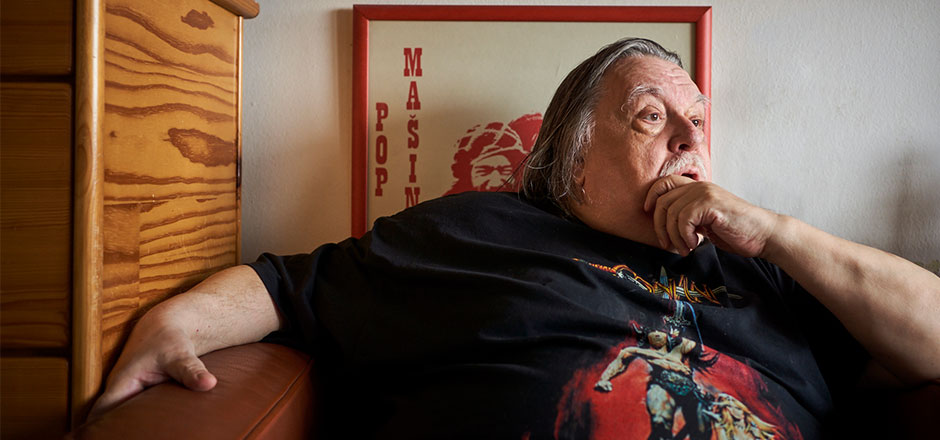Robert Nemecek: A musician eternally in love with film
You would be hard-pressed to find anyone in Serbia who doesn’t know the name Robert Nemecek.The most famous movie and tv director and the legendary lead singer of the group “Pop masina” (Pop machine), he was the name behind almost every notable TV show and movie we’d ever loved.
Nemecek talks about his youth, love for music and filmmaking for 011info and reveals to us how he became No. 1 at what he does.
You were born and raised in the heart of Belgrade. What was your childhood like?
I was born at 42 Majke Jevrosime street and the “Kinoteka” cinema was right around the corner. I went there to watch silent movies from my earliest childhood and I was already in love with film before I started junior school. It was my first great love and immensely precious to me. I loved French movies from before WWII and of course American black and white movies from the 40’s and the 50’s. I knew them all by heart even as a kid, because I’d seen them many times over.
It was there in Kinoteka, watching silent movies, that I’d realized I kept seeing a kid my age over and over again. I started recognizing him, but it took me over 50 years to realize that the kid who loved the same movies I did was actually Moma Mrdakovic, today a famous director working in America. Boban Arandjelovic was another regular, today the absolute greatest connoisseur of classical films in our region.
There was a menagerie of interesting characters living right in your neighborhood. That was where you also met another good friend of yours - Dusan Prelevic Prele, the famous bohemian.
It’s true, we had some big personalities wandering about that neighborhood back in the day. There was Ljuba Djordjevic from Siluet, then the great guitar artist Ljuba Sedlar who later played with me often. Prele, though, he was something special. Today many people are name-dropping him, but I happen to know he despised most of them - with good reason, I came to understand. He was always dear to me, even though back then people tended to avoid him because of his strong temperament. We met when he moved to Lole Ribara street from the Red Cross.
Back then, since I’d always been heavy, I decided to learn the basics of street fighting, so I can protect myself from bullying. I packed a good punch, moreso because of my weight .Over time I gained enough confidence that I never backed away from a fight and so I never got beaten up.
Then Prele moved over. He’d only been in the neighborhood for two or three days when we had a small kerfuffle. We were trash-talking one another from afar - him from his terrace and me from my yard and I ended up saying “What do you want - if you’re so tough, why don’t you come down here”.
And so he did. Cockily, I tried to hit him but he dodged and I still don’t know where exactly he’d struck me, but I ended up falling to my knee. I was open and I knew that if he decided to kick me right then, he could end me.
But instead of doing that, he just said “Don’t do that” and offered me his hand to help me up. I never forgot that gesture, even though we never talked about it again. We became friends after that and played together in some bands. First as “Siluete Tomija Sovlija” (The Silhouettes of Tomi Sovilj” and then later as “P-Set and The Sounds”. The “P” in the name stood for Prele. Back then Prele was on the drums and vocals - he was really good at the drums even though he never practised. Later, when my son was born, Prele became incredibly attached to him and would come over often to play with the baby. It was the Prele that most people didn’t know. He was really an incredible guy - very emotional, very big-hearted, but also prickly and short-tempered. Especially towards ‘fakers’. Tirke and Mika oklop were that way too. We were a unique crew, today a bit half-forgotten. But they were real characters. They don’t make them that way anymore.
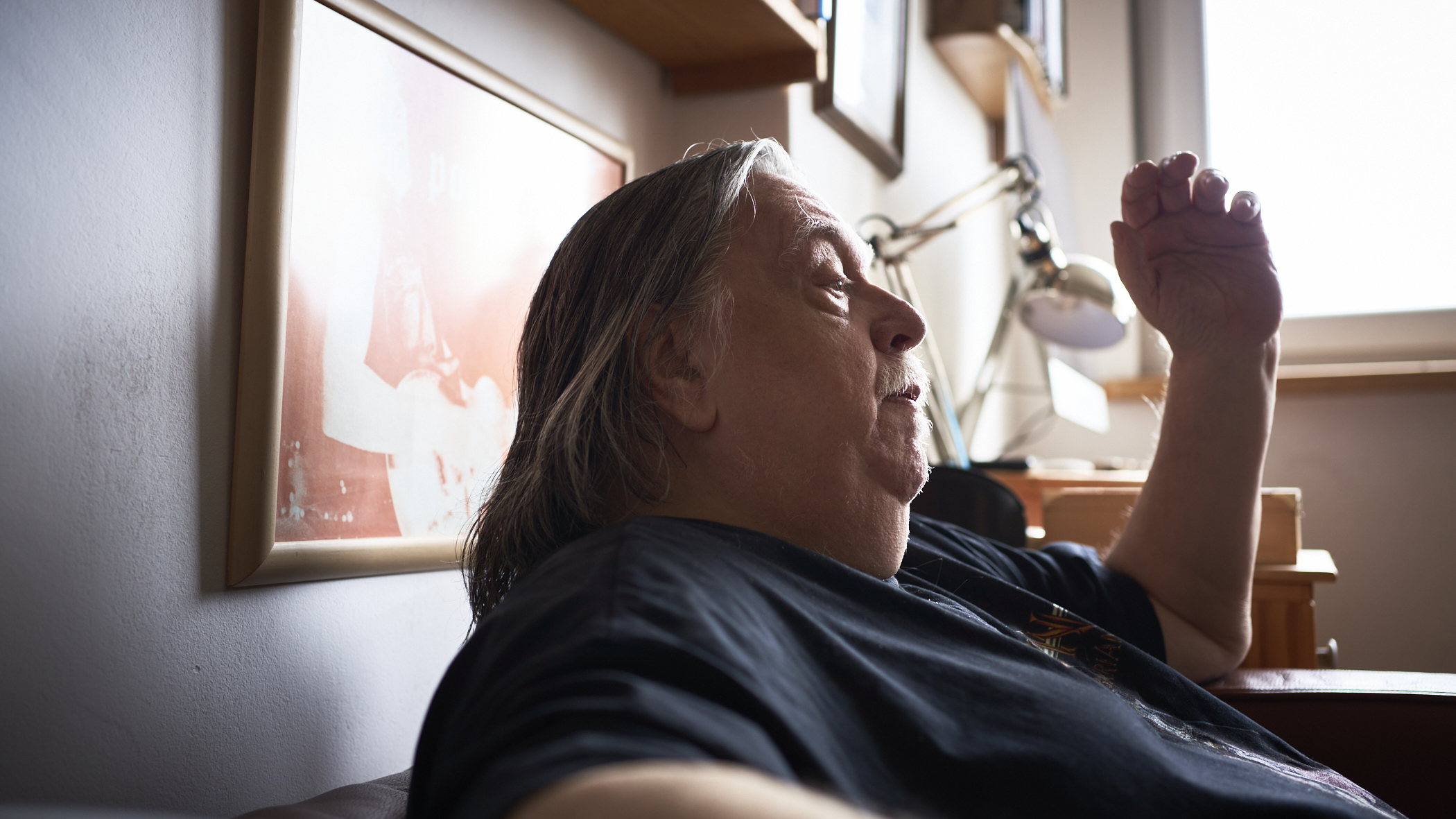
There were other interesting characters as well…
Yes, of course. For example, Srdjan Zelenovic also lived in the neighborhood. He’s the man who acted in two of Andy Warhole’s most famous films - “Flesh for Frankenstein” and “Blood for Dracula”. He lived in the same building as my friend Zika Amerikanac who had lived with his parents in America and came home in 1966. I think that before coming home he’d bought and brought over all the long-play records in existence. We’d listen to them from dawn to dusk. It was the first time I heard about the Doors, or Dylan’s “Blonde on blonde”, “13th floor elevators”, “Seeds”, “The Fugs”...
That was when you started “writing” your book.
Yes, that was the first “scam” I pulled when I was a kid. I dabbled in many things - films, music, socializing. I was a good student, but in the second half of eight grade I stopped going to school. It just wasn’t interesting anymore. And I came up with a way to get away with it and not get written up for my absence. You see, I was a pretty good writer and had won a few awards for my works in previous years. I used that as leverage at school to sell them this story that I was writing a book. They believed me and allowed me to miss school in order to ‘dedicate myself to my writing’. Of course, there was no book. But I did start playing music.
You come from a family of musicians who all had a big hand in developing the art in our country. How did this affect little Robert?
Music runs deep in my family tree. My father was a concertmaster as well as my grandfather. They were violinists. My great-grandfather came from Czechoslovakia to Belgrade per personal invitation of King Milan Obrenovic, in order to help found the royal orchestra. He ended up loving Belgrade so much that he stayed.
Then after, my grandfather founded the Music Academy and Belgrade Philharmonic Orchestra. He was a stern and rigid man. For example, he didn’t allow his family to have a radio in the house. He’d say “There’s no need for us to listen to that - we’re the ones who play.”
From my mother’s side, I lived in Majke Jevrosime 42 and on my father’s side in number 43. In the latter, there was a big room where Belgrade’s string quartet would rehearse. Various musicians would visit there, some even world famous. Like Jasha Heifetz, the famous Jewish violinist who is mentioned in all music history textbooks. We had musicians from around the world over who would come and sit down to play with my grandfather’s string musicians before each concert. That’s how I grew up surrounded by music.
Though it was interesting in certain ways, the classical music and the achievements of my father and grandfather didn’t really affect me in my own musical development. That influence came from my uncle, whom I respected immensely and who completely led me astray from classical music.
My uncle came to Belgrade when I was about to graduate from the music high school. I had started to play with some bands and when my uncle heard me perform, he told me never to go to the music academy because I’d never learn anything there. “That place is for those who reproduce. If you just want to play someone else’s music all your life, feel free to go there. But I can tell that you won’t”, he’d said to me.
My entire family never forgave him for that.
He gave me a list of various artists to listen to and learn from and I turned it all into music. My uncle was the first to tell me that if I wanted to get into the core of someone’s music, there was no shame in copying them. Not in order to reproduce their work, but in order to better understand their thought process while forming the piece.
He was in fact an academically educated musician, but he played Jazz abroad and was one of the people who popularized that genre in our country.
He was an exceptional man and I learned the most from him.
During the war, the Germans would take our young and hardy lads to Germany to work on their estates because most of their men were serving in the military. When the Allied forces began to close in, they’d often eliminate those workers. That was why one night my uncle made a run for it. They chased and shot at him and got him in the leg. But even wounded like that he managed to crawl over to the American line. Since he wasn’t a stupid man, he asked if he could join the American army. That’s how he became their soldier and got the chance to play in American clubs after the war. Seeing how he was a tremendously talented trumpet player, he made it all the way to the orchestra of the legendary Harry James. He really had a lot of experience and knowledge.
I remember somewhere in ‘68 or ‘69 I played for him “I gotta get a message to you” by the Bee Gees on some small portable record player. I told him I wanted to start learning the song bit by bit and he looked at me and said “What do you mean bit by bit? I’ll just write it down for you.” And then he took a pen and wrote it all down - every line and note and parts played by the bass, the guitar - every instrument. That, having heard the song just once and it didn’t really seem like he was listening that carefully. He had an incredible ear for music.
Later he went to Novi Sad to play for the Novi Sad Radio orchestra and work with young bands.
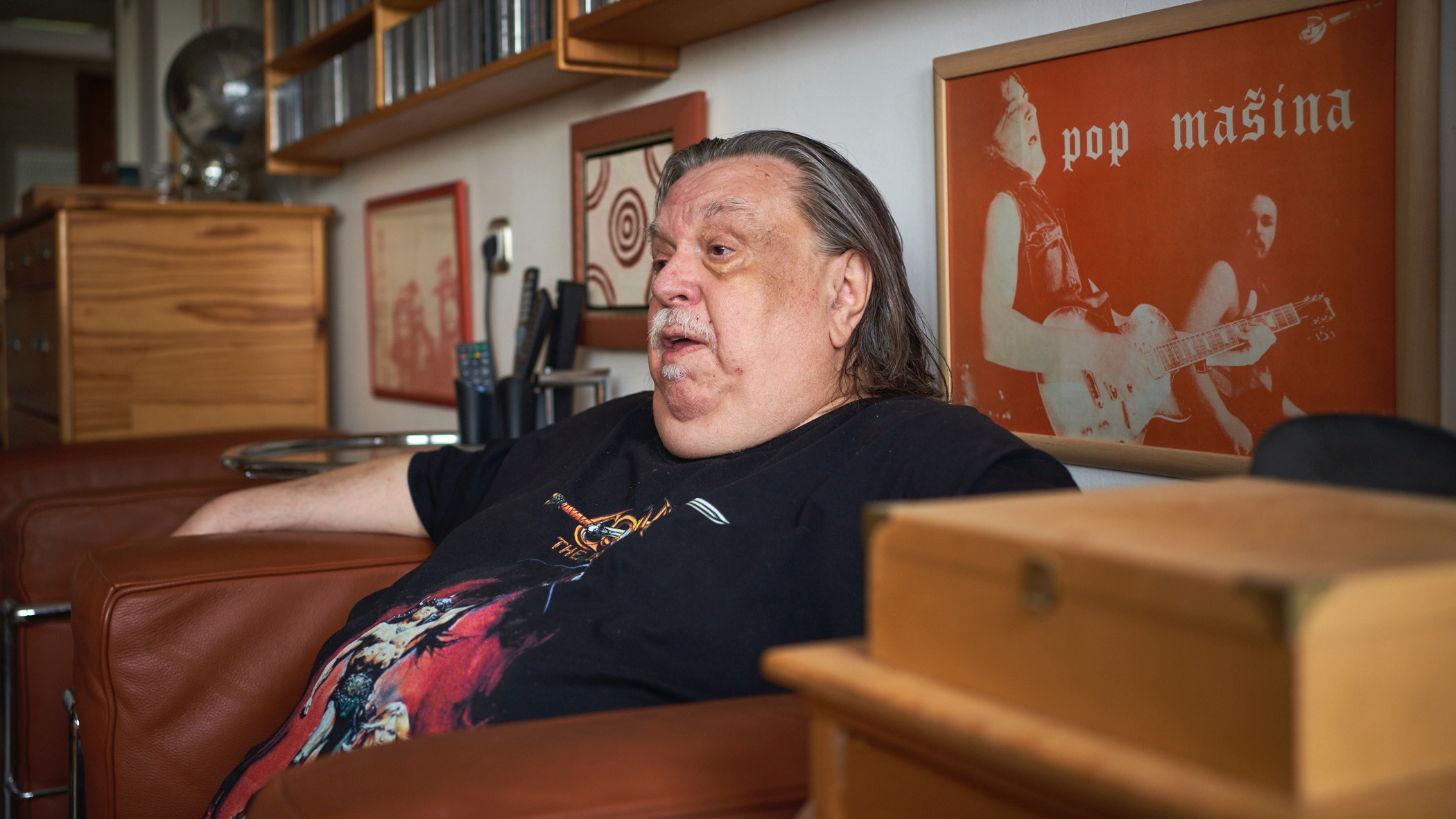
Maybe it was thanks to your uncle that you never stayed in a single music direction?
I never wanted to let myself be limited to a single kind of music. For example, while I loved Miles Davis from the “Bitches brew” era, I never had any special inclination towards jazz. I liked English folk groups like “Fairport Convention” or “Steeleye Span”, “Strawbs”, but also Americans like Crosby, Stiles, Nash and Young, “Eagles”, “Beach Boys” - I loved all of their harmonies.
It all sort of came together like a brew inside of me, resulting in unique music that came out of me in the end.
For example, “Zemlja svetlosti” (Land of light), one of Pop machine’s most famous songs, came to be from us having a big concert at the Hall of Sports and me saying that I felt like playing a bass solo in A-mol, but I didn’t know for what song. So I said if I didn’t find a song to play it in, I’d just write one and so I did. I wrote that one song just because I felt like playing a bass solo and it became a cult hit to this day.
After graduating high school you went to England. It was an important experience for your future work, especially on television.
The first time I went to London it was a much different city than it is today. I’ll never forget how I ended up in this small shop by chance in 1968. There were two old ladies elbowing one another in amazement because they saw a Chinese man walking by. There were no other ethnicities there back then.
And don’t get me started about musicians from England. The stories we know are nothing - they’re just regular people.
When I lived there, my next-door neighbor was Mitch Mitchel, Jimi Hendrix’s drummer. He told me that when they go to America they act like big-shot stars, have bodyguards and all that, but in England they’re all just a group of friends. The time I spent there really helped me understand their mentality and get into the core of the business. What mattered to those big names had nothing to do with what we imagined.
I was the first to work with major Hollywood companies after the embargo and the entire situation we had back then and it was a pretty fun affair. During the sanctioning everyone was accusing me of piracy and saying I’d get sent to prison. And then the sanctioning came to an end and mine was the only TV station to get greenlit. Why? Because the foreigners realized I was the only one who understood the business.
Living in England and understanding their mentality really helped me there.
The most important thing to them was to work with someone who knew the business, knew how things worked and wouldn’t lie to them because they know from the start what you’re capable of. They make programs and invest a lot of money - they won’t give them to someone who’d squander it all by broadcasting at the wrong time or treating potential viewers irresponsibly. They can’t stand bad business practices and money is secondary in that whole story when it comes to small countries like ours. Because though we might’ve paid a few thousand dollars for the TV rights to a movie, the Germans had paid millions for the same.
They liked me the most because I refused to accept offers they made because they’d done well in America. I’d tell them they wouldn’t do as well in our country and it would always turn out I was right.
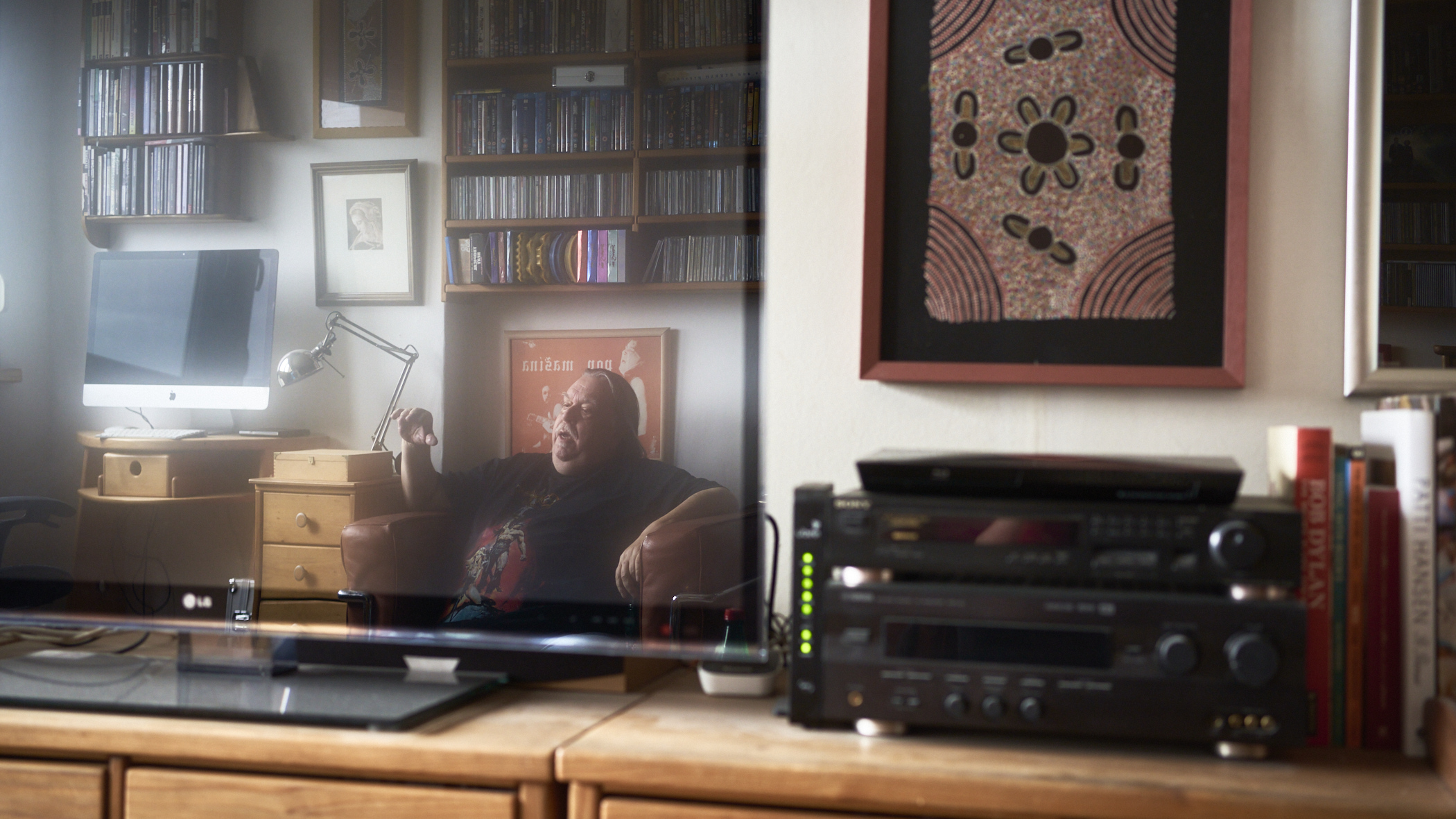
How do you estimate what passes well with the audience when it comes to movies and shows?
In everything I did in life, the most important factor had always been - who was I talking to? Who was I trying to communicate with and what does that person need. Answering those questions showed what they would like or not. My personal taste never had anything to do with it - unlike many others. Other stations try to put on what ‘the boss’ likes or what most of their colleagues like. It’s even worse when they broadcast something completely out the left field without any kind of audience sampling for the program. It’s a disaster. I’d never allow it even if they cut me to pieces.
You said that you’d predicted certain shows would ‘flop’ in our country. What did you base that on?
Let’s take the show “Ally McBeal” as an example. When it was a huge hit around the world, I’d get calls from people proudly telling me they’d reserved it for me even though many other TV stations were asking for the rights to show it in Serbia. I told them they can sell it right away and I wasn’t interested. When they called me crazy, I told them that the show would flop in Serbia. There just won’t be many people interested in it and that would be that. When they asked me why I thought that, I explained my reasons. The lead actress was too small and slim - unacceptable for a heroine in Serbia. Second, her workplace is in those office boxes they have in America that we didn’t and still largely don’t have in Serbia. It meant that the audience wouldn’t be able to identify with the characters and step into their shoes. Those were just a few reasons why I felt the show would do poorly in our country and it turned out I was right.
Still, you had ‘the nose’ to discover unexpected gems thrown away by others.
That has to do with how the show “Nikita” came to our country. I was at the Warner Brothers and they were offering various new shows to me but they all landed kind of flat to me. And it later turned out they’d flop.
But I happened to look towards a shelf with some tapes and saw ‘Nikita’ written on one. I asked them what it was about and they told me that it was some project they did with the Canadians and it was a disaster. They couldn’t sell it to anyone and they’d stopped offering.
Put it on, I said. I only watched until the end of the introduction and told them I’d take all of the episodes because that type of thing would take off in Serbia 100%. They thought I was crazy, but the show ended up really well received with our audience. They later let me know that it had taken off in some other countries as well.
It’s just important to know what and at what time will pass with people. You have to know and respect your audience.
In that regard, you took notes from the British.
In England, I learned one very important thing. When you look at their TV schedule for the week, you’ll see that they arrange programs the opposite way from what we do. In our country, if one TV station has a show on in one time slot, then three other stations will put a TV show in the same slot. That’s the wrong way to do it, because that splits the audience and everyone gets fewer viewings, thus throwing advertising money out the window. The trick is to put something from a completely different profile to that slot, if possible equally appealing, to pick up the audience that aren’t interested in the other slot content.
It’s as though our TV stations are determined to compete by driving up their prices, without realizing that they’re just tightening the noose around their own neck - it loses meaning after a point. Eventually you just won’t be able to compete.
For example, at one point they’d driven the price for Turkish shows through the roof, making every show much more expensive than the best American shows. It’s senseless. And there’s no justification in the ratings either because the viewer base splits off over time. They pile up a certain kind of content to a nauseating point until the audience isn’t interested anymore.
Before there were Turkish shows, the so-called ‘Spanish soaps’ were popular in our country. Today we know just how popular they were, but back then you didn’t want to include them in your program schedule right away.
I was working on Pink at the time and hadn’t wanted to take on a telenovela for a long time. I thought they were low-hanging content and that we can’t play it alongside premium American shows. I felt that we had to wait. The publishers wouldn’t have wanted us to run a show like “Friends” or “Sopranos” alongside something like “Llovizna”.
When I estimated the time was right, many thought I was in the wrong. But we aired “Esmeralda” which recorded up to 42% ratings at certain points. That meant that up to 42% of our population were tuning in to watch. Nowadays, only a major sporting event can achieve those ratings.
Then at some point the ratings began to fall so I decided we should air “Chicago Hope” and other American shows after it. Everyone at Pink thought we would sink and nobody could explain how we ended getting more ratings in the end.
Based on your experience, what advice would you give to someone starting a TV station?
If someone wanted to make a viable TV station now, they would have to make an analysis of what no other TV stations currently offer in our country. Anything that’s already present will have its audience in one place. But on the other hand, so many people aren’t watching TV anymore because there’s nothing good on, that if someone did manage to capture the audience - even every fifth viewer - they would steamroll all other stations.
What are negotiations like with foreign companies when obtaining rights to movies and shows?
When I enter negotiations with major companies, I take several hours before the meeting to concentrate, prepare and go over my paperwork. They are draining meetings that can last for hours. The entire time you’re there, they’re probing you for weaknesses and holes in your knowledge. At least that’s how it is until they get to know you. For example, when I started meeting with Warner Brothers, they asked me ‘Why don’t you take one of our older shows, like Northern exposure’? That one was incredibly popular.’.
And I said that wasn’t their show at all, it belonged to Universal. ‘Oh no,’ they said, ‘slip of the tongue.’ No it wasn’t, they just wanted to see if I knew their programs or not.
They invest immense amounts of money into their blockbusters and if they want to get that money’s worth, they would need to sell them to every station for about 200.000 dollars, realistically. But nobody will give them that kind of money. Then, it all comes down to knowing how to pull it off. You usually negotiate with someone in Europe who answers to someone in Hollywood and has an obligation towards the producer to get as much money as possible, as well as having a lower limit they can never go under. My tactic was usually to tell them I’d take a certain movie and pay the full asking price, but only if they let me have all the movies from the library which usually cost 5.000 dollars each for 1.000 dollars. They’d accept and we’d get more than our money’s worth. Sadly there are many people who misunderstood and would talk how Nemecek pays too much for movies, without understanding how things work.
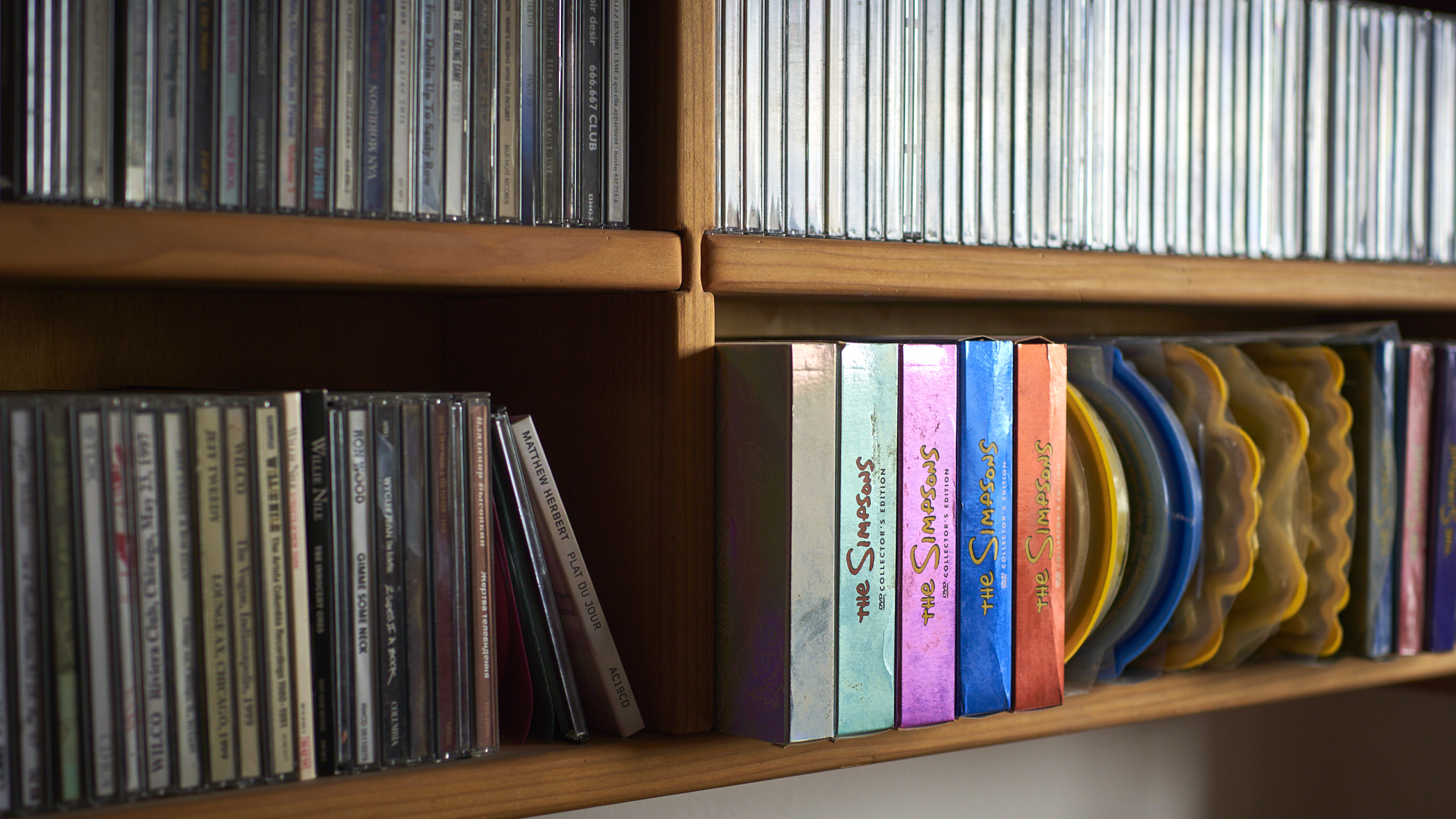
It’s a well-known fact that it was thanks to you that the Simpsons came to our country and became so popular. But not many know that you employed an unusual negotiation tactic to make it happen.
Back then, the Simpsons were completely unknown in our country while being one of the most expensive shows to buy. At Fox, they told me there was no way to cut me a deal because the Simpsons were their highest profiting show. I told them that I was taking a risk by buying it because I’d have to fight to make the Simpsons brand known and popular in Serbia and I couldn’t afford to lose out on it, so I was only able to pay around 500 dollars per episode. Much, much lower than they’d ever sold to anyone. They had to request permission personally from Matt Groening, the show’s creator - he had the last word. Groening just asked them one thing, he said ‘Do you trust this man?’ They said they did and he approved it. And in the end, the Simpsons really became popular in our country.
But in order for that all to happen, I had to first analyze the situation with TV Sarajevo. They showed the Simpsons right before the war, but they just wouldn’t take off with the audience. So I found this one guy who compulsively taped everything that aired on TV for years and got my hands on some Simpsons episodes aired by TV Sarajevo. Just one look and I knew why they never took off - the translation was horrible. There was just no humor to the dialogue because someone had just off-handedly translated it as a chore. That’s when I knew I had to find an amazing translator to adapt all the jokes and humor to our language. And I did.
Once I stopped managing the Simpsons, they immediately began to fail in our country. Why? Because they immediately changed the air time. You don’t do that. If you air a show at a certain time slot, you let it keep that time slot for as long as it exists in your schedule. We’re the only country where they shift the slots like that. Our viewers already have to adapt and sacrifice some time of their day if they want to watch something regularly. Even if it’s small, they formed their schedule around that time slot, and then you go and change it. If they can’t adjust again, the show will fail.
It’s also known that Disney features came back to our screens thanks to you.
I managed to return Disney to RTS who had lost their contract with them before the war. I got to them through a lady who was on the Disney board of executives - her seat right next to Steve Jobs. I asked her for help because Disney representatives in Europe didn’t want to hear about us and she agreed. After the Disney board meeting she called me and just said “Congratulations, you got Disney back”. I was amazed.
Later, as a token of appreciation, they sent me a framed unique painting that was hand-made by their animator who does Mickey, Goofy and Donald Duck today. It depicts Disney heroes with the Avala tower.
People don’t understand that money doesn’t matter to them because they have so much of it. What matters is that you have passion to fight for their programs to succeed in your country.
But it was precisely because of Disney that you had your falling out with RTS.
Disney had sent us giant cutouts of their characters to put in RTS hall per my personal insistence. That way, anyone who entered would immediately be flooded with Disney optimism. But instead of setting them up, they put up banners for Rados Bajic’s new shows.
That was when I called Tijanic’s secretary and filed my resignation, stating that I no longer agree with RTS’s policies and that this wasn’t the RTS I fought for.
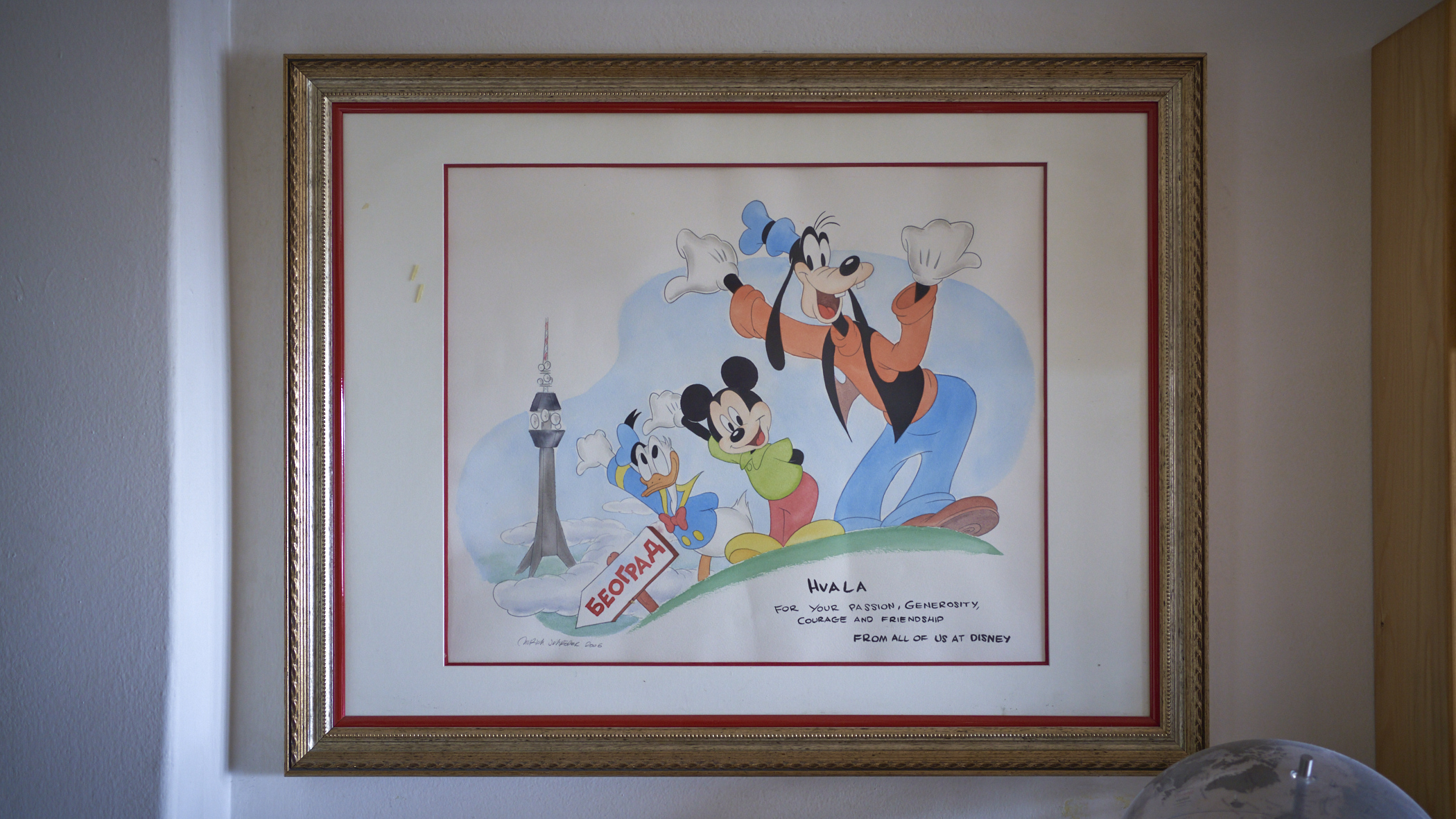
You and your son Jan remastered old Rock machine recordings and published them under the name “Anthology 1980-1983”. What was it like to work in the business as a family?
We had a problem in that Jan didn’t know what kind of sound we had back then and what it was supposed to be according to my ideas. He knew what Rock machine would sound like if they walked into a studio and recorded today. But we worked together on it and I think we did a great job.
I did compromise with him on one thing and I still regret it to this day. I let them shave off some low frequencies on one of the songs because Jan thought they were too blaring. To this day I still miss them when I listen to it. Still, he helped me a lot with his knowledge of modern technologies. Jan likes to say to me “You’re stuck in the old days and think that we still move the mixing switches by hand”.
I think it’s important to pay attention to the phenomenon of heritage and cultural legacy in our country. Everywhere around the world, cultural legacy is incredibly valuable. In England, for example, you can find music from any band that ever existed and played music. In our country, not only does nobody bother with preserving it, but we haven’t even cleared up the basics. We can’t reduce the entirety of our musical legacy to only Morkanjac. We have to include popular pop and rock music as well.
That was my main motivation for re-publishing Rock machine music. If I hadn’t put every ounce of my efforts into it, it never would’ve happened.
At times you were under some heavy fire from certain individuals for your interest in Aleister Crowley and showing vampire themed movies during Christian holidays.
That’s an incredibly old story that gave me a lot of entertainment from time to time. The most extreme part of it was when an edition of a colorful magazine ran an article about me while “Baywatch” was airing. The article said that it wasn’t a coincidence that the show was airing at its specific time slot, but that there was an occult reason behind it.
I never understood what gave them that idea.
It all began when I was working for “Politika” and ran chronological movie cycles at 4PM. So one New Year’s night I ran Coppola’s “Dracula” so that starting January 1st I cound start airing the oldest movies in that vein, starting with “Nosferaty”, “Dracula has risen from the grave…” and so on. And that’s how it happened - since we were going chronologically by date of filming, that “Dracula has risen from the grave” happened to air on Christmas. The problem was that Dracula in that movie was imprisoned in a cave that had a massive cross on the entrance preventing him from leaving. He escapes the cave by breaking the cross and stomping on it. And of course certain individuals latched onto that, insisting that I was airing cross-stomping movies on the biggest Christian holiday. It wasn’t intentional, nor did anyone think of it that way.
Then someone claimed that I brought Crowley’s Thelemic mysticism to former Yugoslavia, which was completely incorrect. It was brought here by some Slovenians and Croatians whom I’d never met or had any affiliation with. I actually never had any affiliations with anyone from there. To me, Crowley was a revelation and I learned a lot from him. Many people have a skewed image of him and I feel that he is today sadly misunderstood and misused.
In order to be a true satanist you have to be a demented person. And by that I don’t mean people who just use the symbols without understanding their significance. The satanists we have today are dangerous. Crowley was nothing compared to them because they did everything he’d rejected and knew was wrong.
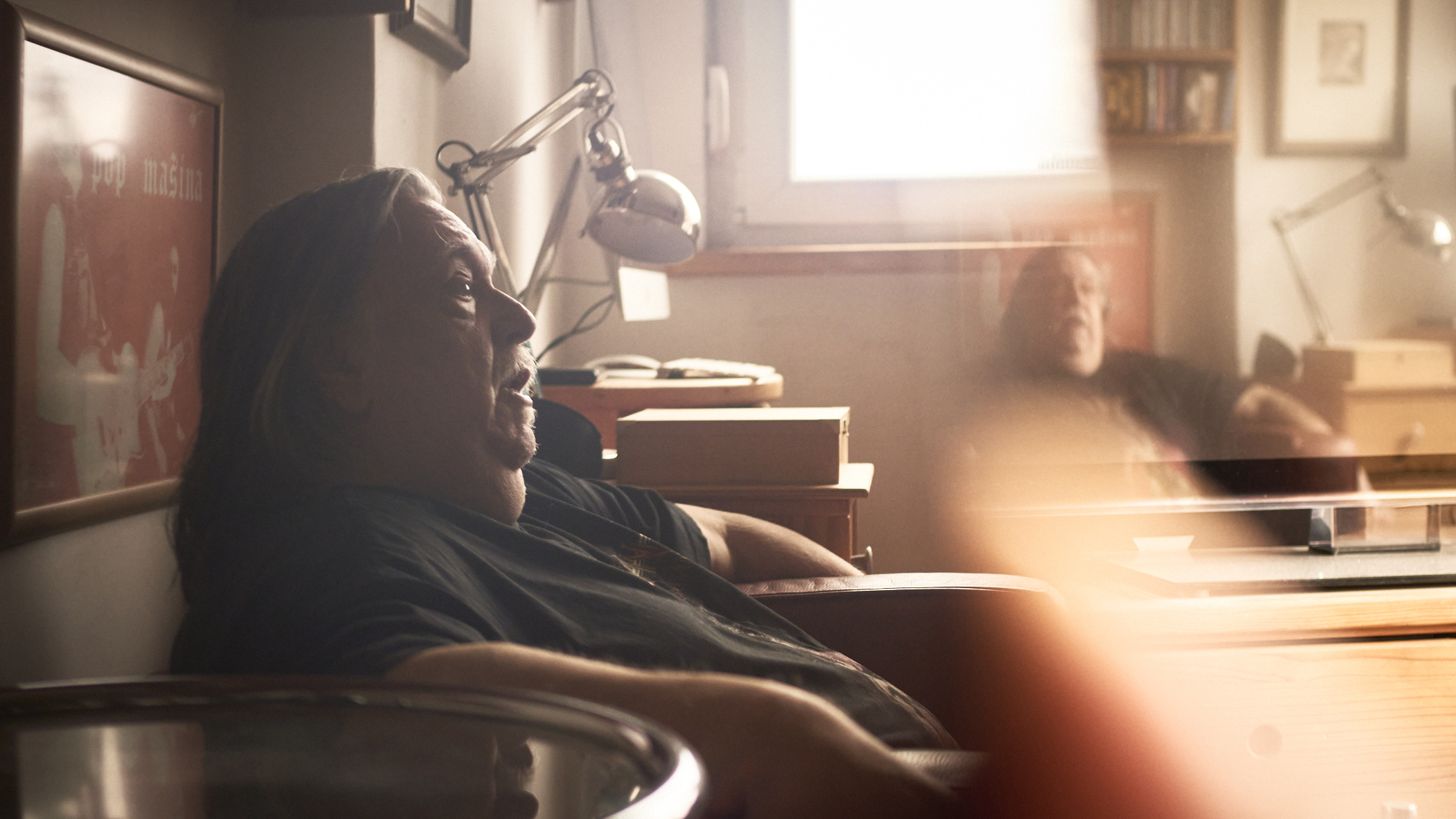
You’re also well known in the circles of music and film collectors. You even share free ‘bootleg’ recordings of famous musicians on your website.
I own around 22.000 music discs, though I put away a lot of it and transferred it to hard-drives and the internet by now. Black and white movies are my favorite part of my collection - from silent movies to the films from the 50’s, I own around 1700 of them and still discover gems I never knew about.
In terms of music, people are still downloading it every day and will continue after I am gone because I told my son to keep managing the website. Around 20 years ago I got in touch with some serious collectors and spent a lot of money collecting ‘bootleg’ recordings. Some of them cost me hundreds of dollars. There are 1200 Dylan’s concerts alone. You’ll find music gems and rarities that are hard to come by and I am sharing them for free because I think that music must live.
What are your plans for the future?
I am 71 years old. Although I have no big health problems and don’t think I’ll kick the bucket anytime soon, I’d never start something just for the sake of keeping myself busy. I have plenty of energy, as well as knowledge and experience, but the biggest thing that bothers me is that I haven’t shared it with anyone yet. I wish I could teach the ins and outs of television at a university, to show people how to make good television and ratings.
But I have a reputation of being difficult to work with and of only working for big money. People don’t realize this is entirely false. I just don’t make exceptions and compromises because if I do something I want it done in the best possible way. That complicates matters because I don’t really have an authority complex, nor do I expect any money until we have achieved success and started generating revenue.
Still, we will see what will happen. There are always options to be found.




 7 ℃
7 ℃

